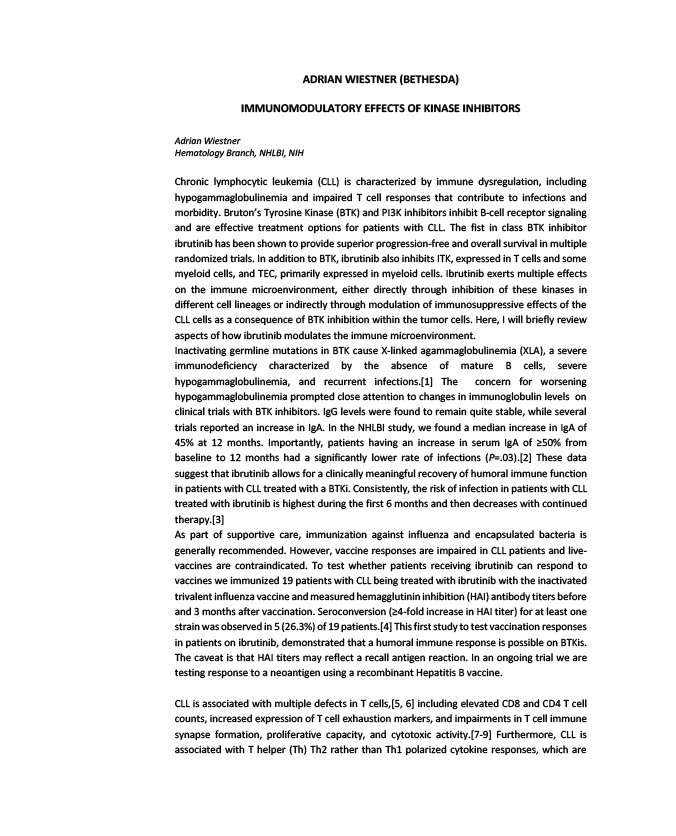
ADRIAN WIESTNER (BETHESDA)
IMMUNOMODULATORY EFFECTS OF KINASE INHIBITORS
Adrian Wiestner
Hematology Branch, NHLBI, NIH
Chronic lymphocytic leukemia (CLL) is characterized by immune dysregulation, including
hypogammaglobulinemia and impaired T cell responses that contribute to infections and
morbidity. Bruton’s Tyrosine Kinase (BTK) and PI3K inhibitors inhibit B-cell receptor signaling
and are effective treatment options for patients with CLL. The fist in class BTK inhibitor
ibrutinib has been shown to provide superior progression-free and overall survival in multiple
randomized trials. In addition to BTK, ibrutinib also inhibits ITK, expressed in T cells and some
myeloid cells, and TEC, primarily expressed in myeloid cells. Ibrutinib exerts multiple effects
on the immune microenvironment, either directly through inhibition of these kinases in
different cell lineages or indirectly through modulation of immunosuppressive effects of the
CLL cells as a consequence of BTK inhibition within the tumor cells. Here, I will briefly review
aspects of how ibrutinib modulates the immune microenvironment.
Inactivating germline mutations in BTK cause X-linked agammaglobulinemia (XLA), a severe
immunodeficiency characterized by the absence of mature B cells, severe
hypogammaglobulinemia, and recurrent infections.1 The concern for worsening
hypogammaglobulinemia prompted close attention to changes in immunoglobulin levels on
clinical trials with BTK inhibitors. IgG levels were found to remain quite stable, while several
trials reported an increase in IgA. In the NHLBI study, we found a median increase in IgA of
45% at 12 months. Importantly, patients having an increase in serum IgA of ≥50% from
baseline to 12 months had a significantly lower rate of infections (P=.03).2 These data
suggest that ibrutinib allows for a clinically meaningful recovery of humoral immune function
in patients with CLL treated with a BTKi. Consistently, the risk of infection in patients with CLL
treated with ibrutinib is highest during the first 6 months and then decreases with continued
therapy.3
As part of supportive care, immunization against influenza and encapsulated bacteria is
generally recommended. However, vaccine responses are impaired in CLL patients and live-vaccines
are contraindicated. To test whether patients receiving ibrutinib can respond to
vaccines we immunized 19 patients with CLL being treated with ibrutinib with the inactivated
trivalent influenza vaccine and measured hemagglutinin inhibition (HAI) antibody titers before
and 3 months after vaccination. Seroconversion (≥4-fold increase in HAI titer) for at least one
strain was observed in 5 (26.3%) of 19 patients.4 This first study to test vaccination responses
in patients on ibrutinib, demonstrated that a humoral immune response is possible on BTKis.
The caveat is that HAI titers may reflect a recall antigen reaction. In an ongoing trial we are
testing response to a neoantigen using a recombinant Hepatitis B vaccine.
CLL is associated with multiple defects in T cells,5, 6 including elevated CD8 and CD4 T cell
counts, increased expression of T cell exhaustion markers, and impairments in T cell immune
synapse formation, proliferative capacity, and cytotoxic activity.7-9 Furthermore, CLL is
associated with T helper (Th) Th2 rather than Th1 polarized cytokine responses, which are